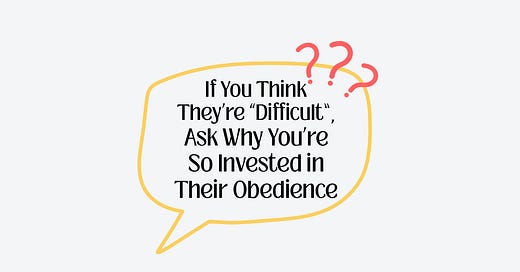If You Think They’re “Difficult,” Ask Why You’re So Invested in Their Obedience
When did being “easy to handle” become the gold standard for being worthy?
“Difficult”
It is a word that hides behind professionalism. It gets tucked into reports, passed around in hushed tones, slipped into conversations as if it's neutral.
It's not.
It’s a control word. A containment word.
It’s what people say when someone stops performing ease and starts being real.
“Manageable.”
It sounds harmless. Even helpful. A word dressed in concern, hiding an expectation:
Be small. Be predictable. Be comfortable to be around.
The myth is that manageability equals progress.
That a person’s capacity to meet your expectations is a reliable measure of their well-being.
That compliance means things are going well.
It doesn’t.
What you're calling “difficult” might be someone refusing to disappear
Let’s be honest about what “difficult” really means in neurodivergent contexts:
They don’t comply without asking questions
They express themselves in ways you don’t recognise
They set boundaries that don’t match your timeline
They respond to harm with resistance, not passivity
They stop trying to make you comfortable at their own expense
None of that is difficult. That’s self-protection. That’s autonomy.
But when someone no longer moulds themselves into what's convenient for you? You call it a problem.
Maybe the real issue isn’t their behaviour. Maybe it’s your need to control it.
When you call someone “easy to manage,” what’s usually being rewarded is:
Quietness
Masking
Passivity
Agreeableness
Emotional restraint
Compliance under pressure
None of these necessarily reflect safety, health or support. More often than not, they reflect survival strategies. Especially for neurodivergent people.
The moment someone stops resisting is not always the moment they feel safe.
Sometimes it’s the moment they stop believing anyone is listening.
SENDwise Hub is a reader-supported publication. To receive new posts and support my work, consider becoming a free or paid subscriber.
Obedience is not a virtue—it’s a demand
Let’s call this out as it is:
If your respect for someone disappears the moment they stop being agreeable, it was never respect to begin with. It was a reward system.
Too often, neurodivergent people are praised when they’re quiet, still, compliant and pathologised when they’re not.
But silence doesn’t mean safety. Stillness isn’t peace.
And managing someone’s behaviour to keep the environment comfortable isn’t care. It’s coercion.
The system loves manageable people
Why? Because manageable people don’t make demands.
They don’t disrupt the schedule.
They don’t challenge the rules.
They don’t need the system to change.
They bend. They adjust. They shape-shift.
And the system calls that “resilience,” when it’s actually just exhaustion with a smile on top.
Stop pathologising resistance
Neurodivergent people are not here to fit.
They’re not here to blend.
They’re not here to be sculpted into something palatable for systems that never made space for them in the first place.
Calling someone difficult for refusing to perform ease is nothing more than a warning showing you’ve confused obedience with value.
You’ve mistaken conformity for connection.
You’ve lost sight of what respect looks like when it’s not built on control.
What if manageability isn’t the goal?
What if the goal isn’t to keep someone “under control” or “on track” or “easy to support”?
What if the goal is connection—messy, honest, disruptive, real?
Because support that only works when someone is calm isn’t support. It’s containment.
And praise that only shows up when someone’s behaviour is tidy? That’s conditional love, dressed as affirmation.
Ask yourself:
Why do you need them to be easy in order to treat them with dignity?
Why is compliance the price of belonging?
Why does autonomy register as defiance?
What you interpret as “difficult” might actually be someone refusing to abandon themselves to meet your expectations.
And that refusal?
It’s not dysfunction.
It’s clarity.
⭐ If you’re looking for neuro-affirming digital resources, you can browse them here.
⭐ Voting is still live for the National Diversity awards - click here.
⭐ If you’re on any social media, come join me on Facebook, Instagram or LinkedIn.




